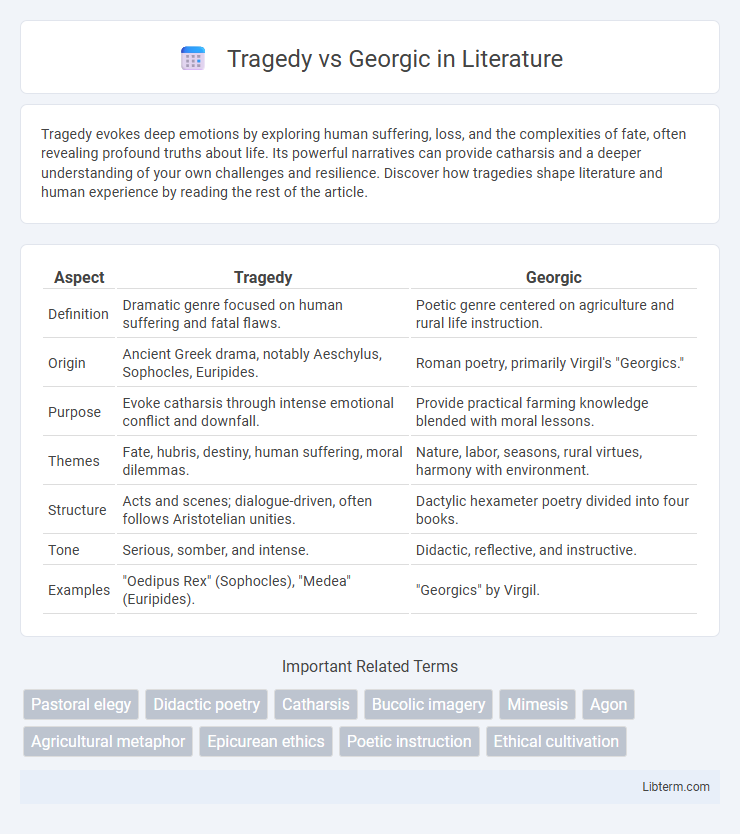Tragedy evokes deep emotions by exploring human suffering, loss, and the complexities of fate, often revealing profound truths about life. Its powerful narratives can provide catharsis and a deeper understanding of your own challenges and resilience. Discover how tragedies shape literature and human experience by reading the rest of the article.
Table of Comparison
| Aspect | Tragedy | Georgic |
|---|---|---|
| Definition | Dramatic genre focused on human suffering and fatal flaws. | Poetic genre centered on agriculture and rural life instruction. |
| Origin | Ancient Greek drama, notably Aeschylus, Sophocles, Euripides. | Roman poetry, primarily Virgil's "Georgics." |
| Purpose | Evoke catharsis through intense emotional conflict and downfall. | Provide practical farming knowledge blended with moral lessons. |
| Themes | Fate, hubris, destiny, human suffering, moral dilemmas. | Nature, labor, seasons, rural virtues, harmony with environment. |
| Structure | Acts and scenes; dialogue-driven, often follows Aristotelian unities. | Dactylic hexameter poetry divided into four books. |
| Tone | Serious, somber, and intense. | Didactic, reflective, and instructive. |
| Examples | "Oedipus Rex" (Sophocles), "Medea" (Euripides). | "Georgics" by Virgil. |
Understanding Tragedy and Georgic: Core Definitions
Tragedy is a dramatic genre characterized by serious themes, noble characters, and a catastrophic ending that evokes pity and fear, emphasizing human suffering and moral dilemmas. Georgic poetry, rooted in Virgil's "Georgics," focuses on rural life, agriculture, and practical knowledge, celebrating the harmony between humans and nature through didactic verse. Understanding these core definitions highlights tragedy's exploration of existential conflicts versus georgic's instructional and pastoral narratives.
Historical Origins of Tragedy and Georgic Genres
The historical origins of tragedy trace back to ancient Greek theatre, where it emerged as a form of dramatic storytelling centered on human suffering and moral dilemmas, exemplified by playwrights such as Aeschylus, Sophocles, and Euripides. Georgic literature, rooted in Roman poetic tradition, developed through works like Virgil's "Georgics," emphasizing agricultural themes, rural life, and practical advice blended with philosophical reflection. These two genres reflect distinct cultural priorities: tragedy explores existential conflicts and catharsis, while georgic poetry celebrates pastoral cultivation and the harmony between humans and nature.
Key Characteristics of Tragedy
Tragedy features protagonists who often face a fatal flaw or hamartia leading to inevitable downfall, evoking catharsis and deep emotional engagement in the audience. Key characteristics include a serious and somber tone, noble or high-born characters, and a plot driven by conflict and moral dilemmas culminating in a catastrophic conclusion. The structure of tragedy commonly follows Aristotle's unities of time, place, and action, emphasizing a coherent and focused storyline.
Essential Elements of Georgic Poetry
Georgic poetry centers on didactic themes, emphasizing agricultural practices, rural labor, and the harmonious relationship between humans and nature. Essential elements include practical instructions, personification of the earth and natural forces, and moral reflections tied to farming life. Unlike tragedy, which explores complex human emotions and catastrophic events, georgics promote knowledge, order, and the value of hard work in sustaining society.
Major Works: Tragedy vs. Georgic
Major works of tragedy include Sophocles' "Oedipus Rex," Shakespeare's "Hamlet," and Euripides' "Medea," which explore intense human suffering and moral dilemmas through complex characters and dramatic plots. Georgic literature, exemplified by Virgil's "Georgics," John Milton's "Paradise Lost," and James Thomson's "The Seasons," emphasizes agricultural themes, nature, and rural life while promoting practical knowledge and harmonious coexistence with the environment. Both genres reflect distinct cultural values, with tragedy focusing on human fate and calamity, and georgic poetry celebrating pastoral labor and natural cycles.
Themes and Motifs: Suffering vs. Labor
Tragedies explore themes of suffering, fate, and human vulnerability, highlighting characters' emotional and moral struggles often leading to downfall. Georgics emphasize labor, agricultural work, and human interaction with nature, celebrating productive effort and harmonious rural life. While tragedy focuses on inevitable suffering and loss, Georgics elevate the dignity and virtue found in persistent toil.
Emotional Impact and Reader Engagement
Tragedy evokes intense emotional experiences such as pity and fear, fostering deep empathy and catharsis that deeply resonate with readers. Georgic poetry centers on practical themes like agriculture and rural life, engaging readers through vivid descriptions and reflections on human harmony with nature. The emotional impact of tragedy is immediate and profound, while georgic works cultivate a steady, contemplative engagement grounded in reality and moral lessons.
Philosophical Implications of Tragedy and Georgic
Tragedy explores the philosophical implications of human suffering, fate, and moral ambiguity, highlighting the conflict between individual agency and the inexorable forces shaping destiny. Georgic literature reflects on the relationship between humans and nature, emphasizing ethical stewardship, labor, and the pursuit of harmony through practical wisdom. Both genres engage deeply with concepts of human existence, but tragedy centers on existential questions of meaning and despair, while georgic invites contemplation of human responsibility and sustainability.
Influence on Modern Literature and Culture
Tragedy and Georgic genres have profoundly shaped modern literature and culture by influencing narrative structures and thematic explorations of human experience and nature. Tragedy's exploration of fate, morality, and human suffering informs contemporary drama, film, and psychological storytelling, emphasizing complex character development and emotional depth. Georgic themes emphasizing harmony with nature, agricultural life, and practical wisdom appear in modern environmental literature and eco-criticism, fostering cultural reflections on sustainability and rural traditions.
Tragedy or Georgic: Lasting Legacy and Relevance
Tragedy endures in literary history through its profound exploration of human suffering, moral dilemmas, and catharsis, influencing drama and storytelling across cultures. Its themes of fate, hubris, and downfall continue to resonate, shaping modern narrative structures and theatrical performances. The timeless relevance of tragedy lies in its capacity to evoke empathy and provoke philosophical reflection on the human condition.
Tragedy Infographic

 libterm.com
libterm.com